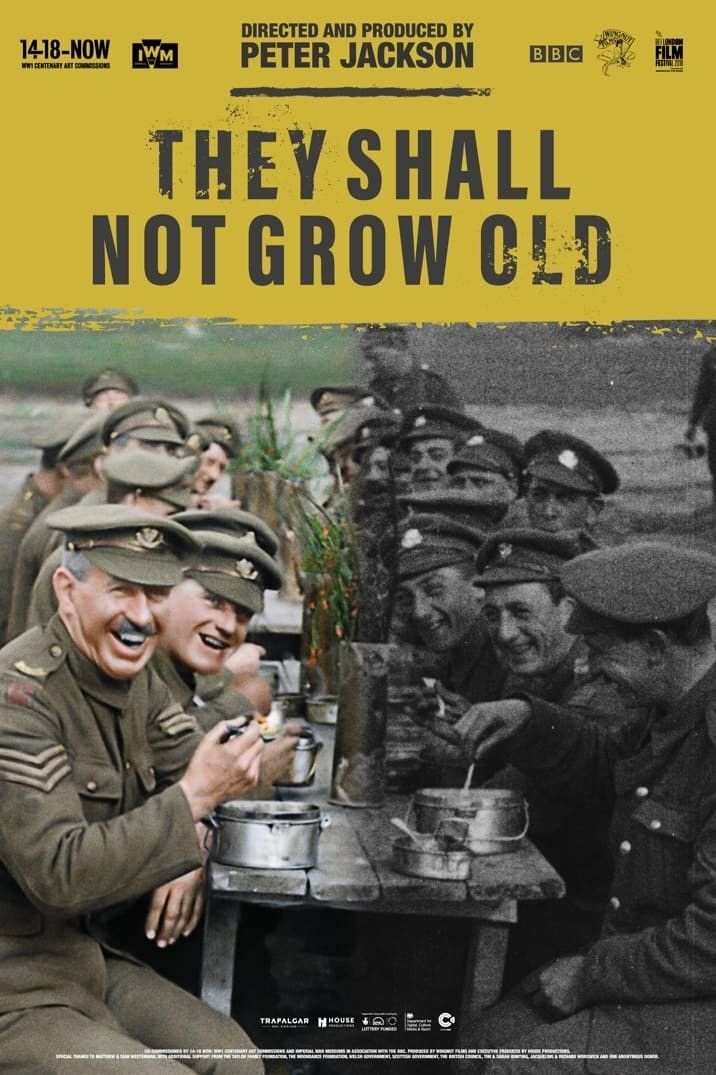BY J. CHRISTIAN ADAMS
https://pjmedia.com/jchristianadams/they-shall-not-grow-old-peter-jacksons-masterpiece-war-memorial/
December 19, 2018

Our war memorials are usually made of brass or stone. But Peter Jackson’s astonishing new film They Shall Not Grow Old is a war memorial for the big screen.
Jackson’s film has done the impossible: He has created a time machine. Jackson was given access to the sound and video archives of the Imperial War Museum and tasked with producing a documentary about World War I in time for the centenary commemoration of the armistice on November 11, 2018.
After playing to sold-out theaters across the United Kingdom in October, the film will show just one more day in the United States – December 27. December 17, the only day the film has shown so far in the United States, saw packed theaters.
Jackson’s film portrays the World War I soldier as you have never seen him: in color, in high definition, and with sound.
They Shall Not Grow Old painstakingly cleans up the old jerky films of the Great War. It removes the blemishes, turns them into clean high definition, and colorizes them with thorough, painstaking accuracy. The film speed is even reset to natural motion, so no more unnatural gaits.
Jackson’s technical wizardry turns the landscapes of France into something vivid, expansive, and apocalyptic.
But it’s the faces of the young soldiers that will haunt you. Instead of the old washed herky-jerky films with their blurry soldiers marching by, Jackson uses modern technology to wipe clean the dust of a century and draw out the real people who endured unendurable trench life.
The faces are so young.
They are the kids down the street. They are the people you see every day in your own life. They gaze at you across the century and change forever the history of the Western Front in your heart.
An officer reads a morale-boosting charge before a company roars into the hell of the Somme in the summer of 1916. Jackson’s filmmakers dug up the original orders from that day and produced a voiceover of an officer using the geographically correct dialect based on the regional unit insignia. Indeed, Jackson employed lip readers and voice actors from the correct regions of the United Kingdom throughout the film to provide dialog anytime onscreen lips move.
You just cannot shake the faces.
In the first sweeping scene where Jackson transitions the film from the familiar black and white footage from the war to his opening, surreal, horrific, colorized portion (think of Dorothy waking up in anti-Oz), the camera follows a British solider no more than 18 years old attempting to navigate a scarred, muddy hell-scape.
The British solider also follows the camera following him. His bright young eyes gaze at you in the carnage. He grabs a shattered splintered tree stump to help himself out of the trench, yet his gaze never abandons the cameraman from a century ago. The fine long splinters of the stump – shockingly fine thanks to Jackson’s work – are the product of violence the earth cannot withstand.
Behind the young soldier, the world is devastation in vivid color. Mud, muck, absolute complete destruction of the world itself.
We journey forward to the trenches, where the rats and the corpses and the men all live as one. They eat, and live, and die on top of each other, all in high-definition color. Men slip into the mud and vanish forever. Brown iodine is swabbed on bleeding arms shot cleanly through by German bullets. A parade of the gassed march by with their arms on the shoulders of the men ahead.
These are real people, something the old black and white films of course contained. But somehow, that medium dehumanized them.
They Shall Not Grow Old brings them alive, like we have a pass to visit them in Flanders and Passchendaele. The film is a memorial to the World War I soldier perhaps more profound than the Cenotaph.
Jackson transports us back to a sunken road where a unit rests on the grass with fixed bayonets. The men shortly would charge over the grassy hillside before them. Jackson even traveled to the exact location of this scene so he could get the shade of green right for the grass. The soldiers are sitting, collecting their thoughts, preparing for the charge. Jackson explained in a post-screening feature that this unit was mostly wiped out and that the film “captured the last 30 minutes” of their young lives.
There is no narrator to the documentary. Instead, the voices of World War I veterans guide the film with short recollections of events, feelings, and memories. These oral histories were captured in the 1950s and 1960s by the BBC, and Jackson finds a way to sequence them loosely in the visual story.
They Shall Not Grow Old is refreshingly apolitical. Absent is the usual conventional wisdom expounding the uselessness and generational waste of the conflict. Wilfred Owen doesn’t make an appearance. Politics would be unseemly, because the film plainly seeks to memorialize the men who fought and died. Indeed, some of the narrator vets say they actually enjoyed the war and treated it like a boy scout frolic. Others said they were just there to do their jobs. Jackson keeps politics out, which is refreshing these days when visiting the Cineplex.
Jackson’s grandfather fought in the Great War. He says the purpose of the film is for you to find out if any of your relatives fought in the war. He notes that in 20 years, the generation that could know the answer will be gone. If they did fight a century ago, They Shall Not Grow Old provides a window into what they experienced.
No comments:
Post a Comment